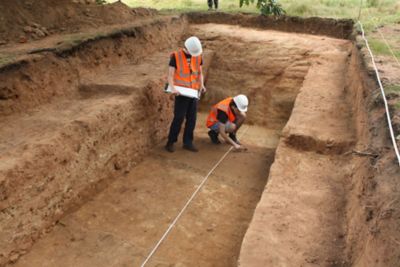
Fieldwork, and the opportunity to get stuck in, is an exciting part of our degree. It’s also the part that many of our students look forward to the most!
All our archaeology undergraduates have the opportunity to take part in a dedicated fieldwork placement. So, whether you’re doing single honours archaeology, or taking it with another subject, you can get involved. To be precise:
Single honours students studying BA Archaeology are required to do 20 days of fieldwork
Joint honours students have the option to do 10 days of fieldwork
We also encourage students who want to gain further professional experience, such as museum work. This is arranged by students directly and approved by the department.
What are the benefits?
Fieldwork is where much of our primary information about the past comes from, and it's important to learn about its advantages and limitations.
Working on site is the best way to learn new archaeological skills, as well as offering a valuable team-building experience. And, you never know, you just might unearth some hidden treasures!
You will:
- Gain hands-on experience in surveying and excavation
- See finds in context and learn how to study real archaeological evidence
- Build skills in laboratory work and data analysis
- Work individually and as part of a team in real-world professional contexts

It was great getting hands-on experience. These excavations allowed me to see the full process of archaeological investigation in practice; from the first spade in the ground through to site recording and finds processing.
David
BA Archaeology graduate, now working as Collections Manager for English Heritage
How does it work?
Fieldwork is usually completed during the summer break, but it can be done at other times of the year. If you are a single honours student, you must complete at least part of your fieldwork requirement in the first year of your degree.
Where do students do their fieldwork?
We currently offer four pre-approved fieldwork training providers, as below:
- SHARP (Sedgeford Historical and Archaeological Research Project)
- Norfolk Poulton, near Chester (Cheshire)
- Wollaton Park, Nottingham, run by York Archaeology
- Caistor St Edmund (Norfolk), run by Will Bowden in the department
All our approved providers meet health and safety and safeguarding requirements. They can also make adjustments so that fieldwork is accessible to all, including students with medical conditions/disabilities.

Fieldwork at Wollaton Park. Image credit: York Archaeology
How does the assessment work?
You will be asked to keep a journal of your fieldwork experience and fill in relevant sections in an Archaeology Skills Passport, which records your experience and level of competency in key archaeological skills.
You do not receive a grade for your fieldwork, but it will appear on your degree transcript.
What about funding?
Many of our excavations are free but may require travel expenses. For example, for overseas excavations you may need to pay for your own flights, while others will require a training fee. You can claim back a proportion of your costs from the department.
The legal bit
Optional placements/internships and integrated year in industry opportunities may change at any time for a number of reasons, including curriculum developments, changes to arrangements with partner universities or placement/industry hosts, travel restrictions or other circumstances outside of the university's control.
Every effort will be made to update this information as quickly as possible should a change occur.






